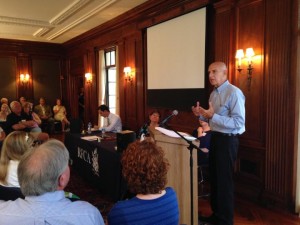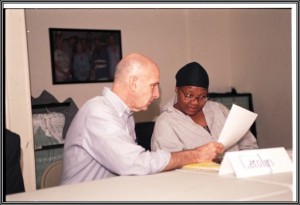Good morning, and thank you for inviting us to join you today. More importantly, thank you for the great work that the Raskob Foundation does. I say that as a volunteer who has personally benefited from your work.

Ignatian Volunteer J Langdon shares his IVC experiences with the Raskob Foundation’s Board of Directors
How many transformative experiences have you had in your life? I’m 67 years old and I can count on one hand the number of truly transformative experiences I’ve had in my life, literally one hand: Jesuit high school, Marine Corps, birth of my first child, death of my first wife…and volunteering through the Ignatian Volunteer Corps. In each case, I was one person prior to the experience and another after it.
This morning I’ll share with you a bit about the most recent of these transformations: Volunteering though IVC. To understand the defining effect my IVC volunteer experience has had on me I need to give you a little background, including who I was before joining IVC, and how I came to IVC.
I spent over 30 years in business before retiring and joining IVC. I’m a pretty focused guy, a little too focused my wife, Lorraine, might tell you. During my business career, I focused on work and family, with little, if any, time left over for things like hobbies, or golf…or volunteering. I sometimes felt guilty about that, but then I’m Irish Catholic so I feel guilty about a lot of things.
Why was I so focused on work? I have a few theories, but whatever the reasons, no amount of money made me feel that my family was financially secure.
Years ago, my wife handed me a cartoon from The New Yorker. It showed two businessmen in heaven. You knew they were business guys because they were wearing suits and ties, and they were bald; and you knew they were in heaven because they had wings and were standing on a cloud. Which is certainly my idea of heaven. In the cartoon of these two guys in heaven, one is saying to the other, “You know, I still worry about money.”
So that’s my relevant background. Here’s how I came to be an Ignatian Volunteer.
I retired in 2008 and moved back to New York City from Ohio where we had been living. We moved into St. Francis Xavier Parish in lower Manhattan, an extraordinary parish with a storied heritage of serving the poor and marginalized.
Not long after we moved into the parish I spotted a note in the weekly bulletin announcing that the IVC Region Director would be around after mass. I had a very vague sense of IVC’s work and was interested. I met for a couple of hours with Liz McMahon, then IVC’s Regional Director. At one point she asked me what I might be interested in doing as my IVC volunteer service. I suggested strategic planning, maybe something in education, possibly fund raising…something administrative. Liz paused for a moment, looked me in the eye, and said, “J, do you know any poor people?” I hesitated because I think of myself as a neighborhood kid. I grew up in a then-working-class neighborhood in Chicago and lived much of my adult life in the grand diversity of New York City.
But, as I thought about it, I realized that I didn’t really know any poor people. Liz then said she thought I could benefit personally, and be better able to help others, if, at least for six months or so, I became personally connected to the world of poverty. I was uncomfortable with the idea, to say the least.
Liz suggested I speak with Cassandra Agredo, the Executive Director of Xavier Mission, another high-impact organization that Raskob supports. I did, and Cassandra described one of Xavier Mission’s programs: the Life-Skills Training and Empowerment program, better known as L-STEP. I could go on for hours about L-STEP, but don’t worry, I won’t. Briefly, the mission of L-STEP is to empower those who are experiencing homelessness to identify and pursue new paths toward more fulfilling lives.

J works on a project with an L-Step participant.
Two times a year, L-STEP leads a group of 10-14 people through a 13- week semester of twice-weekly sessions incorporating personal mentoring, group reflection and life-skills workshops on subjects like making life changes, goal setting, developing a support system, finding employment and furthering one’s education.
My six-month commitment to L-STEP turned into a four-year involvement in one of the defining experiences of my life.
I was one of one of two facilitators who attend all 27 sessions each semester. We get to know each other (that is, the participants and facilitators) extremely well. We have dinner together each evening, share personal reflections, and often speak on the phone between sessions. A month before each semester I’d visit 6 to 8 homeless shelters to recruit participants.
As I met our participants, and as I became familiar with the conditions in New York’s homeless shelters, the homeless individuals I’d see on the street were no longer invisible to me. They were people to be respected for the daily challenges they faced. They were people created and loved by God. They were much like me, only without my good luck.
Now when I read statistics about homelessness, I no longer see just numbers. I see faces, and imagine stories. I’m no longer frozen in place by the complexity of the seemingly intractable problems of poverty and homelessness. There are things I can do to help, even if it’s in small ways. I’ve joined the same battle all of you have.
Are there challenges and frustrations? You bet. But even the challenges contribute to my personal growth and ability to help those less fortunate. And the successes are enormously satisfying.
One night my wife and I were at restaurant with several friends having dinner and I received a text message from a graduate with whom I’d lost touch. The message was, “I’m in a classroom, waiting for my first college class in twenty years to start. Thanks L-STEP.” Or the time I was walking through the 14th Street subway station and heard someone calling out my name. A beaming L-STEP alum embraced me in a bear hug and told me he’d completed culinary school and was working in a midtown restaurant. Or the woman who called and, choking back sobs, said, “Guess where I’m calling from? My new apartment.” Story after story.
In my business career I had successes, and I achieved personal satisfaction. But those successes were, for the most part, reflected on spreadsheets and graphs. Seeing success and personal satisfaction on the faces of our L-STEP grads, and hearing it in their voices, has redefined success and satisfaction for me.
As I wrap up here, let me say that IVC adds a further dimension to the experience of volunteering. First, I would never have become involved with a program like L-STEP, a direct action program, had Liz McMahon not challenged me to venture out of my comfort zone. Second, IVC, through its community and spiritual perspectives, adds considerably to the experience of volunteering. Successes are enhanced and challenges are put into context. New approaches are suggested, and spirits are lifted.
I hope I’ve been able to convey, in some small way, why volunteering, especially as an Ignatian Volunteer, has had such a transformative effect on me.
I’ll finish with one more brief story. My son Michael is a Marine, an infantry captain. One evening Lorraine and I were speaking to him on the phone and he mentioned the “FEBA” a couple of times, yet another military acronym. Lorraine asked him what FEBA meant, and Michael explained that it’s the “Forward Edge of the Battle Area,” the front lines. A few days later Lorraine and I were talking about Xavier Mission with some friends and she said, “You know, Xavier Mission operates at the FEBA.”
So I’ll conclude as I started, by thanking you for your support…from the volunteers who serve, at least for some period, at the Forward Edge of the Battle Area.
